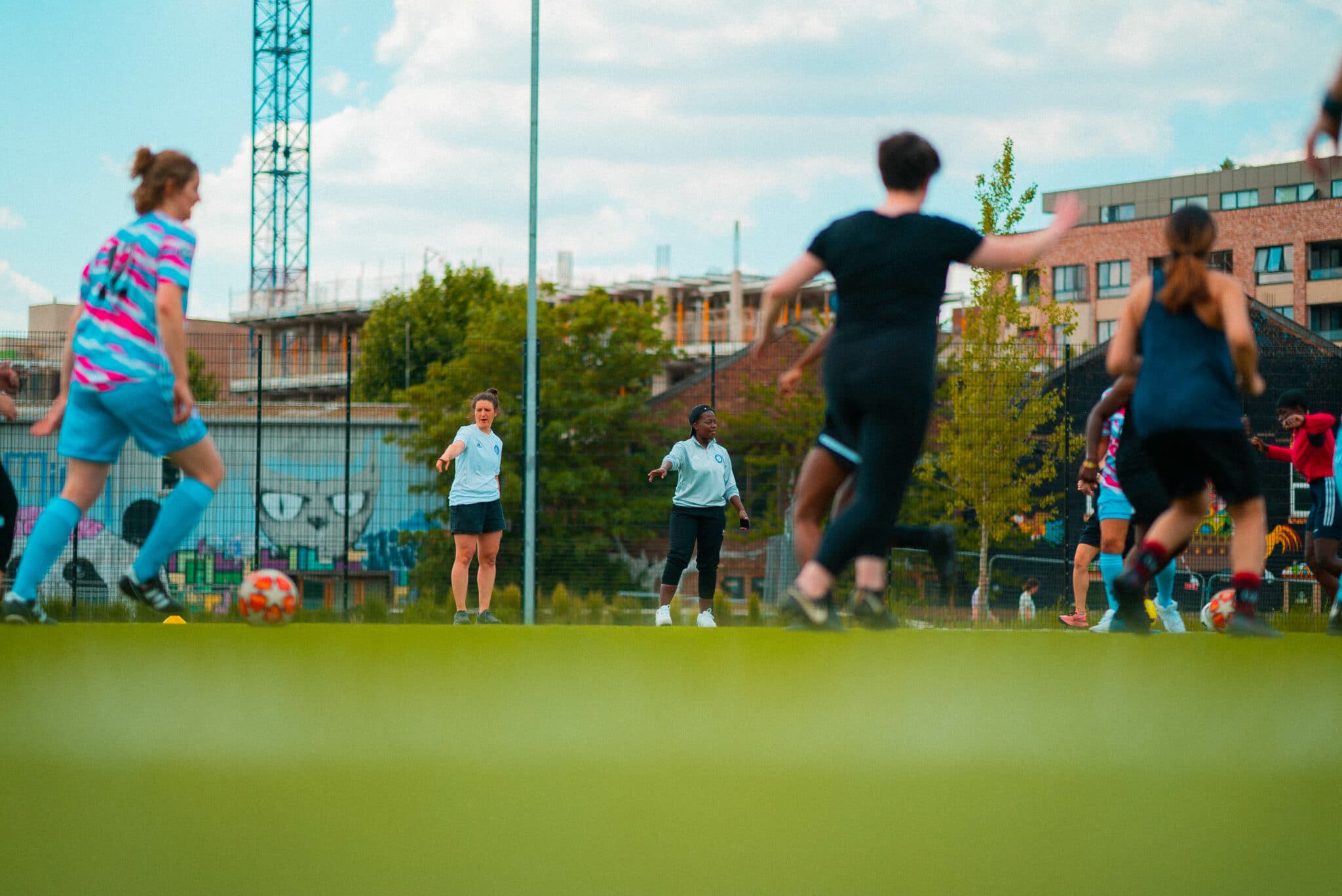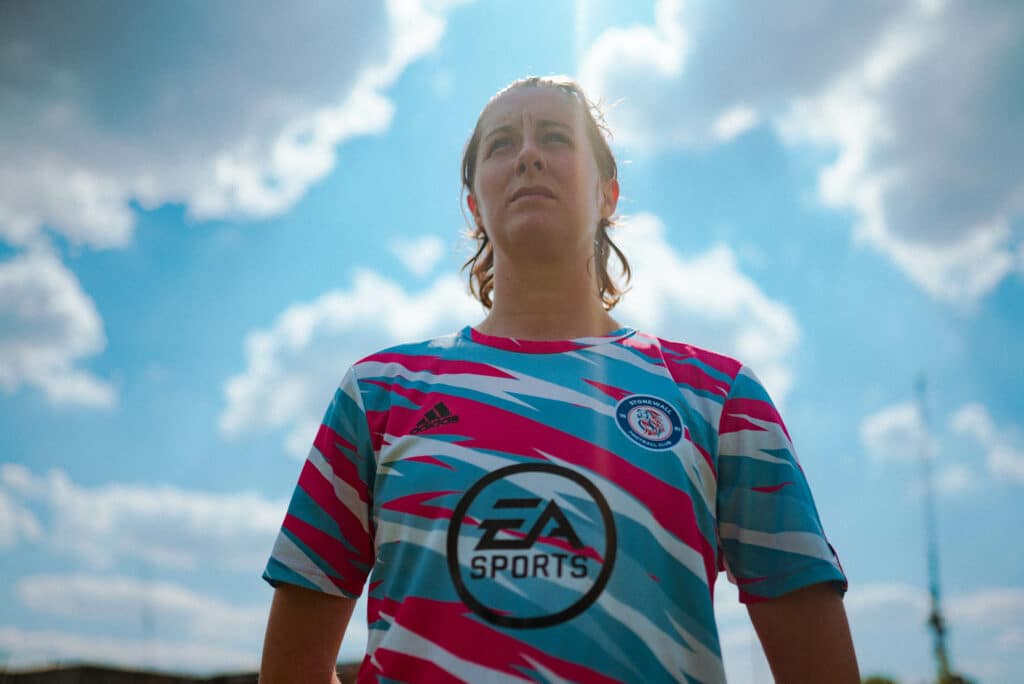Lui Asquith, captain of Stonewall FC’s women and non-binary first team. (Lawrence Bury)
Lui Asquith is captain of Stonewall FC’s women and non-binary people’s first team, having recently returned to football after a long hiatus from the sport.
Here, they explain how ignorance and bigotry forced them to give up the sport they loved for many years, and why it’s imperative that we don’t allow the same to happen to the next generation.
When I am asked to reflect on my childhood, football immediately comes to my mind.
I played it every chance I got and when I wasn’t playing, I was probably thinking about it. I seem to recall smashing most of my parents’ windows practicing my curlers and chopping off every flower head practicing my pens (sorry, again!), whispering self-commentary as I went.
Playing in my football kit was my ultimate form of expression – it was how I felt seen. When I was playing, literally nothing else mattered. Looking at it from this perspective, it makes sense how addictive and saving sport can be to many young LGBT+ people – it has the power to distract and protect us.
So, what happened? Why did something that made me feel so good not continue to be part of my life?
I’ve often blamed it on work, but the truth is that this excuse is a cover-up for something much deeper. As I grew older and continued to play, the sexism, homophobia and transphobia grew alongside with me.
On reflection, the culture I played in (meaning the culture of sport generally in the UK) actively worked against every part of my identity. It’s unsurprising that, over the course of nearly two decades, it resulted in an anxiety that I couldn’t calm. Every training session and match came to make me feel sick with nerves, instead of being my source of freedom.
The last time I played (until recently) was for my university, and it reached a point where studying felt easier than playing, so I hung up my boots (without actually admitting to myself that I was) and pushed it all to the back of my mind. The years in between have been focused on my career, family and friendship – all wonderful, but the loss of football in my life is something I want no other LGBT+ young person to go through. But unless we do something, it’s going to keep happening.
Young trans and non-binary people are being denied access to sports
Within my day job at the trans children’s support charity Mermaids, I’ve spoken to many families who have kids that have been rejected from playing the sport they want to play as a result of being trans, including non-binary. Too many young trans people, who just want to play, are being denied access to the pitch because of who they are. Too many are unfairly being deemed automatically unsafe and unfair because they are trans.
Here’s the thing: being trans does not make you an inherently unsafe player, nor does it make you inherently an excellent player. Anyone who plays sport can confirm that every gender brings with it people of all shapes and sizes – biological essentialism does not fit the nature of sport. Yet I’ve heard of young, passionate players being made to check the register instead of playing, told they “can’t play with the boys” (which is not only an act resulting in a lack of access, but also an act of misgendering) and others ridiculed on the pitch.
This isn’t OK. It is not only limiting these young people’s access to health and wellbeing, it is also exposing them to trauma around their identity. Human categories can’t be homogenised, which is part of the beauty of sport – we need to make this reality trans-inclusive.
We should celebrate trans bodies on the pitch, as much as we do cisgender bodies.
Our perception of the culture in sport starts in childhood and we must start building an inclusive playing field from youth; until we do, the cycle will sadly continue.
It seems we have a long way to go. Looking across the pond we can see that, this year alone, seven anti-trans sports bans in Arkansas, Alabama, Tennessee, Mississippi, Montana, and West Virginia and nearly 70 bills have been introduced in US state legislatures from Rhode Island to Texas, which prohibit trans youth from participating in school sports consistent with their gender identity.
The US is powerful and young people are being harmed by this – the hangover will last generations. In the UK, we have equality laws that only allow for proportionate banning based on fairness and safety (arguably very difficult to engage for young people), however, still, we have too many young trans people being denied happiness on the pitch.
We have seen the toxic commentary around the first out trans person to qualify for the Olympics. Rather than celebrating, Laurel Hubbard’s success is being used to scaremonger wider society around trans inclusion. We should celebrate trans bodies on the pitch, as much as we do cisgender bodies.

So, an update on my football sitch – during lockdown, we all did a lot of thinking and my relationship with football kept coming up in my mind. I still missed it – deeply. So, I started looking for a team to join and finally saw that Stonewall FC was establishing a women and non-binary club. Maybe this was it?
Packed with adolescent nerves, I went to the first session in May 2021 and it has changed my life, for the better. I am playing as myself, around other LGBT+ people and allies – I feel like more myself than I have in a long time, just a bit rustier. It is helping me do my job better, my stress levels are being assisted and it’s bringing new friendships into my life that I didn’t think were possible to create with a full-time job. But sport has a magic to it like that, it creates family overnight and chosen family is crucial for so many LGBT+ people.
For me, the opportunity each week to go and play the game I love, with others who use my correct pronouns without question and are proud of their non-binary players, and so being able to put all my energy into the actual game has created a joy that I haven’t felt since being a kid.
Sport matters for so many reasons to so many people. Some of those people are LGB and/or T – let us play.
Stonewall FC women and non-binary 1sts, 2nds and 3rds train on a Saturday at 2-3.30pm in the Stratford area of London. If you are interested in playing for Stonewall FC, they would love to hear from you. You can sign up here and follow them on Instagram and Twitter.
“Rio! Rio! Rio!” We had a guest appearance this #PrideMonth from the legend that is @rioferdy5
Rio joined us for one of our training sessions this month to take a closer look at the world of #lgbt football & why it’s important that spaces like ours exist. pic.twitter.com/7VxNo3hYE6
— Stonewall FC (@StonewallFC) June 30, 2021
